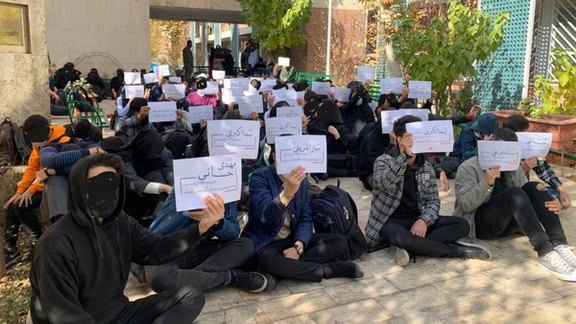Iranian Universities Step up Suppression on Students

Several public universities in Iran have stepped up suppression of students by restricting and banning their online activities, subjecting them to harsh penalties.

Several public universities in Iran have stepped up suppression of students by restricting and banning their online activities, subjecting them to harsh penalties.
On Wednesday, K. N. Toosi, one of Iran's top five technological research universities, announced that students are not allowed to join online platforms such as X (formerly known as Twitter), Facebook, and Instagram, already banned in the country and only accessible via vpn services.
Students must also obtain a permit if they plan to join or create groups with over 100 members in messaging services such as Telegram. This is while Telegram channels are one of the main ways student unions share news.
Any unauthorized activity will result in severe punishments, including temporary study bans and, in extreme cases, a complete ban from studying in any university for up to five years, the university said.
The news comes as students have recently shared pictures online of posters they hang on campus with the headline "the war of women" to protest the recent crackdown on women for hijab. Since mid-April, morality police have returned to the streets, using violence to enforce hijab.
Additionally, universities attempt to prevent female students who have "improper" hijab from entering their campuses. In late April, after the morality police banned over 200 students from entering Amir Amirkabir University of Technology in Tehran, many students went on strike.
K. N. Toosi University has cited the disciplinary rules approved at the height of nationwide protests in Iran in 2022, as the source of these newly disclosed measures.
Students in Iran played a prominent role in protests during the Woman, Life, Freedom movement, which was sparked by the death in custody of 22-year-old Mahsa Amini, who died in the custody of morality police for allegedly not wearing her hijab “properly.”
Students joined other protesters in Iran and chanted slogans against the government. It is estimated that over 700 students have been arrested for demonstrating at universities as well as being attacked and beaten by government forces.
Moreover, universities began summoning, suspending, and expelling students, in addition to imposing new rules and requirements.
On Friday, Tarbiat Modares University of Tehran also texted students, warning them to refrain from any online activity on Telegram channels.
Telegram's Amir Kabir News channel, a student-led group that shares university news, described this action as "ridiculous" and posted a screenshot of the text message.
In the text message sent by the Security Cyberspace Monitoring Center of this university, the students were asked to terminate their membership in the "Twitter of Tarbiat Modares Students" Telegram group, as their online activities were monitored.
On Tuesday, the same channel reported about the pressure put on female students by the disciplinary committee at K. N. Toosi University: "Several female students have received a message that they are wearing their hijab inappropriately.”
In another recent case of intensifying restrictions on students' activities, including in cyberspace, the Telegram channel United Students announced that in the past few months, at least five students were charged with social network activities in the disciplinary committee.
According to the student group, the documents in the cases contained screenshots of tweets and photographs of the students.
Several reports indicate that students protesting the violation of their rights have been punished, and one of the latest cases involves the expulsion from the dormitory of a protesting student at Tarbiat Modares University.
According to the Telegram channel Pishro Students, Ahmed Pirouznia, a PhD student at Tarbiat Modares University, has been permanently banned from the dormitory, canteen, financial services and studying for six years by the disciplinary committee.
As recently as last week, the secretary of the union of Iranian university professors warned that the Interior Ministry and the National Security Council now control Iran's universities.
“Unfortunately, there has been a lot of government interference at the universities. The power of the Ministry of Science has diminished, and it seems the Interior Ministry gives orders to universities,” said Karen Abrinia in an interview with the relatively independent news website Khabaronline.